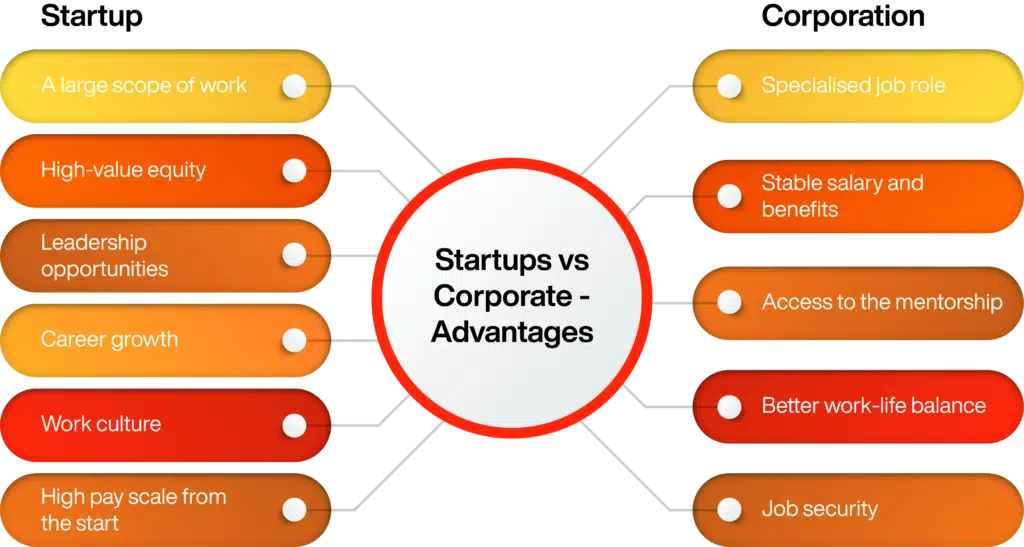Are you weighing the pros and cons of working for a startup or a large corporation? There’s no one-size-fits-all answer, but understanding the key differences between startup and corporate cultures, as well as the varying opportunities each presents, can help you make an informed decision.
Startup Vs Corporate: Comparing Cultures And Opportunities: Startup dynamics involve unpredictable work environments, a focus on creativity, flat organizational hierarchy, resourcefulness, and potential equity stakes, whereas corporate culture is defined by structured workflows, specialization, hierarchical organization, resource abundance, professional development opportunities, and an emphasis on work-life balance.
Dive into this post to explore the detailed comparisons, source materials, and insights on the unique features of both startup and corporate culture, and how they align with your career goals and personal preferences.
Unpredictable and Dynamic Work Environments
A key characteristic of startup culture dynamics is the often unpredictable and dynamic work environment. This is primarily due to the fast pace at which startups need to adapt to the changing market conditions and achieve their goals. As an employee in a startup, you should be prepared for rapid role changes, evolving job responsibilities, and a requirement to quickly learn and adopt new skills. This kind of environment can be both challenging and exciting, especially for those who enjoy the thrill of not knowing what’s around the corner.
For instance, in a groundbreaking midlothian AI startup that recently joined the latest session of Lighthouse Labs, the employees constantly had to adapt to new customer needs and leverage innovative technologies to scale their business. This demanded their continuous learning, honing their skills, and being adaptive to ensure they maintain their edge in the market.

Source: Wellfound
Emphasis on Creativity and Innovation
Startups are known for valuing creativity and innovation. This is because they often venture into uncharted territory and need out-of-the-box thinking to navigate the challenges that come their way. They tend to have a mindset that encourages creative input from their employees, moving quickly to iterate and pivot based on market feedback, and adapting to changing customer needs. As an employee working for a startup, your ideas and suggestions could have a significant impact on the company’s direction and success.
According to a Harvard Business School Online article, startup environments typically present a fast-paced culture, valuing creativity and communication. This kind of culture provides a conducive environment for personal growth, allowing employees to expand their horizons, learn new skills, and innovate constantly.
Flat Organizational Hierarchy
Compared to corporations with multiple layers of management, startups usually have a flatter organizational hierarchy. This ease in communication allows for quick decision-making and lesser red tape when it comes to implementing ideas and innovations. Employees on all levels can contribute to the company’s growth, with limited managerial oversight and simplified processes.
A flatter organizational structure also enables employees to work more closely with the key decision-makers. This not only makes higher-ups more approachable but also increases the odds for personal career development, as employees’ contributions are more visible to the management.
Resourcefulness and Budget Constraints
Due to their limited budgets and resources, startups require employees to be resourceful and flexible in their roles. This could mean wearing multiple hats, and often necessitate staff to perform various roles beyond their typical job descriptions. Working within tight budgets might push you to think creatively and find ways to optimize resources, leading to innovative solutions that you may not have discovered otherwise.
For example, in the case of a smart label startup Sensos that raised a $20 million series A, the employees might have had to be resourceful and creative in allocating funds to streamline product development processes and achieve market traction.
Equity and Compensation Trade-Offs
One of the most significant differences between working for a startup versus a corporation is the compensation structure. Startups may not always be able to offer competitive salaries compared to their corporate counterparts, but they sometimes provide employees with equity stakes or stock options. This structure aligns the employees’ interests with that of the company, creating a sense of ownership and desire to contribute towards the company’s success. When the startup does well, employees with equity stakes can reap substantial financial rewards.
In a recent article on startup valuations, an analysis of stock options helps provide an understanding of their potential long-term value, and considerations employees should make before accepting equity as part of their compensation package.
Work Hours and Commitment Expectations
It’s not unusual for startups to expect longer work hours and increased dedication from their employees. The startup’s inherent drive for market position and growth often means there’s more pressure on the team to deliver exceptional results within tight deadlines. As an employee, you might be expected to work long hours, juggle multiple projects, and contribute your best efforts without the promise of a great work-life balance initially.
However, it’s important to note that these expectations can vary significantly across startups. Some prioritizing employee well-being and try to maintain a sustainable work-life balance for their teams. More importantly, this intense work environment might also lead to greater job satisfaction, as employees feel more connected to their work and have a personal stake in the startup’s success.
Structured and Predictable Workflows
As opposed to the fast-paced, ever-changing nature of startups, corporate environments present more stability and predictability. Large corporations generally have established processes and workflows, providing employees a sense of consistency and structure. For those who prefer knowing what to expect at work, a corporate workplace may be a better fit.
In a corporate setting, tasks follow established procedures and deadlines, often mapped out well in advance. This framework allows employees to plan their time efficiently and work within predictable patterns. According to a Cogs Agency report, roles in large corporations tend to have clearly defined responsibilities and schedules, which many find comforting.
Specialization and Defined Roles
In contrast to the versatility often required in startups, jobs in corporations are more specialized, allowing employees to focus on specific tasks and expertise areas. Corporate positions typically have clearly defined responsibilities, limiting the scope for role changes. This specialization may appeal to individuals who enjoy diving deep into a specific field and dedicating their efforts towards mastering it.
Specialization enables employees to become experts in their chosen field, which can potentially increase their market value and create opportunities for growth and development. Those who prioritize deep expertise may find that a corporate environment better suits their career aspirations.
Hierarchical Organizational Models
Corporations tend to have hierarchical organizational structures, with multiple layers of management and defined chains of command. This framework can lead to slower decision-making, as communication and approvals may need to pass through several levels. However, the multi-layered structure can result in more deliberated outcomes, as decisions often receive input from diverse perspectives throughout the organization.
For employees who appreciate a clear chain of command, working in a corporate setting can provide a structured environment with easily identifiable lines of authority. On the other hand, those who prefer less bureaucracy and faster decision-making might opt for the flatter organizational hierarchy typically found in startups.
Resource Abundance and Perks
Corporations generally offer better access to resources, including technology tools, funding, and comprehensive benefits packages. As noted in the Harvard Business School Online post, corporate environments tend to provide employees with greater stability and security. In addition to health insurance and retirement plans, corporations may offer perks such as in-house gyms or childcare, tuition reimbursement, and generous leave policies.
While the excitement and potential for rapid growth at a startup may lure some job seekers, others prioritize the security and benefits that well-established corporations can provide. For those with families or long-term financial goals, a corporate environment may hold more appeal.
Emphasis on Professional Development and Career Ladders
Employees in corporations can typically expect more formalized paths for career advancement and professional development opportunities. Large organizations often have dedicated training programs and resources designed to promote employees’ growth and learning. Additionally, promotions within corporations tend to follow structured career ladders, allowing employees to envision a clear trajectory for their professional progression.
For individuals seeking steady career growth, a well-defined promotional structure within a corporate environment can be a strong draw. On the other hand, startups’ dynamic nature and frequent role changes might appeal to those seeking more flexible career paths.
Work-Life Balance and Employee Wellness
While many startups can demand longer work hours and increased dedication, corporate jobs often prioritize work-life balance and employee well-being. Predictable work hours and a focus on employee wellness are crucial aspects of corporate environments, aimed at long-term retention and productivity.
Companies that are committed to promoting a healthy work-life balance often facilitate employee engagement and satisfaction, reducing turnover and burnout. For employees seeking a work environment that supports their personal well-being and life outside the office, the more predictable hours and structure of a corporate job may be better suited to their needs.
Frequently Asked Questions
What are the main differences between startup and corporate culture?
Startup culture is characterized by a fast-paced, unpredictable work environment, an emphasis on creativity and innovation, a flat organizational structure, and resource constraints. Corporate culture entails a more structured and predictable work environment, specialization in roles, hierarchical organizational models, resource abundance, a focus on professional development, and an emphasis on work-life balance.
Are all corporate jobs the same, or do they vary depending on the company?
While the general characteristics of corporate culture may be similar across different companies, each organization has its unique qualities and workplace environment based on its industry, size, mission, and values. Job seekers should consider various factors, such as the company’s reputation, location, and growth prospects when evaluating potential job opportunities.
Is one culture better than the other (startup vs. corporate)?
Neither culture is inherently better or worse than the other. It’s essential to evaluate personal preferences, professional goals, and industry-specific dynamics to determine which environment is the best fit. An individual’s ideal work environment may evolve over time, depending on their priorities and experiences.
What are the key factors to consider when choosing between a startup and a corporate job?
Some crucial factors when deciding between a startup and a corporate job include the work environment, the company’s mission and values, job duties and responsibilities, growth opportunities, work-life balance, and compensation and benefits. Personal circumstances and career goals should also be considered when weighing job options.
Are there any hybrid companies that combine elements of both startup and corporate culture?
Yes, certain companies can combine elements of both startup and corporate cultures. These firms are often referred to as “scaleups” – companies that have evolved beyond the startup phase but maintain their innovative spirit and drive for growth. Working in a scaleup can offer employees a unique experience, blending the excitement of a startup with a more structured and well-resourced environment.






